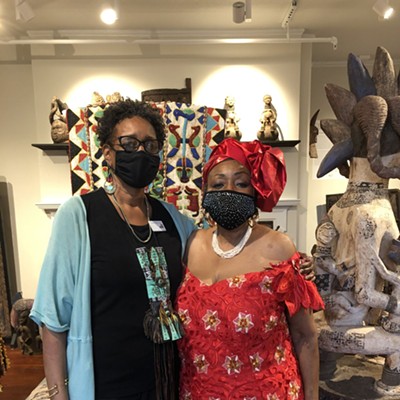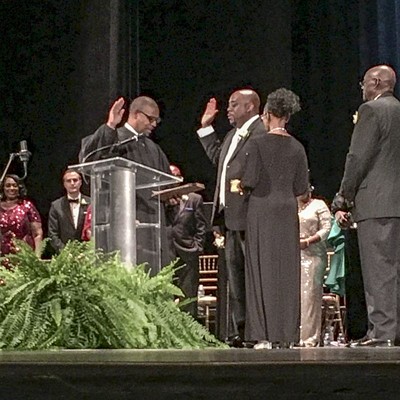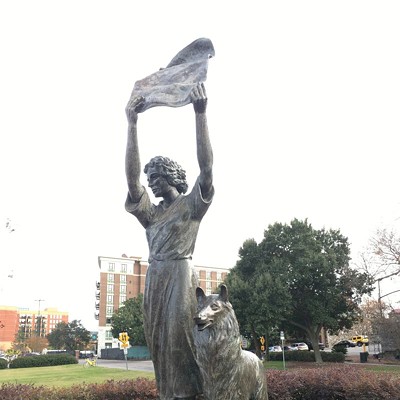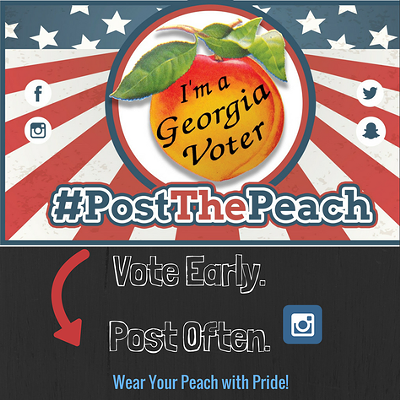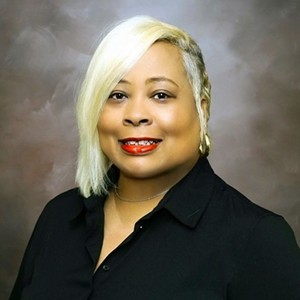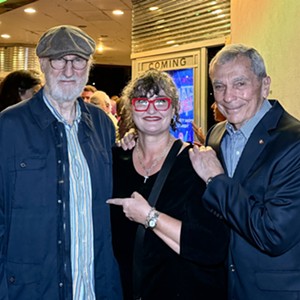LET’S CUT to the chase: The amount of proposed cuts to the 2017 City of Savannah arts and culture budget is almost exactly equal to the full year’s salary the City agreed to pay former City Manager Stephanie Cutter for 12 months after her replacement, Rob Hernandez, was hired.
Cutter’s one-sided sweetheart deal is not news, and has been widely reported here and other places.
However, at last week’s contentious—and in some ways oddly inspiring—City Council meeting, several folks who questioned Hernandez, including at least one Alderman, still didn’t get it.
They confronted him about why his office got a big increase even as the arts and social services budgets were set to take huge, nearly catastrophic hits.
That increase, of course, is due to Savannah paying two City Managers for the job of one—which is actually pretty emblematic of how things are done here.
Hernandez fielded citizens’ questions expertly and bluntly, always coming back to painting the same bleak picture:
City finances are unsustainable in current form due mostly to the actions of his predecessors, and he’s the one tasked with cleaning up their fiscal mess.
For example, he pointed out that construction and drainage projects were cut back to the tune of millions of dollars.
He said he had to dip into the City’s reserve fund to even come close to balancing the budget—an ominous development considering Savannah’s previously ironclad creditworthiness as a municipal government.
Hernandez only made one misstep, a bizarre, schoolmarmish scolding of assembled citizens for clapping after each speaker. The finger-wagging prompted Alderman Tony Thomas, of all people, to rightly advise him, “Remember these are the people we work for.”
The applause, of course, only got louder. Hernandez learned the hard way that you can always tell a Savannahian, but you can’t tell them much.
The boldest irony of last week’s meeting, though, was its kickoff with a long goodbye to former Mayor Edna Jackson, there for the unveiling of her mayoral portrait.
It is of course in part due to Jackson’s own tenure that the City’s financial picture is so hazy, and the reason so many citizens gathered in City Hall last Thursday to literally beg for adequate funds.
Yet, in one of the self-congratulatory dog-and-pony shows for which Savannah is infamous, a half-hour was taken up with extended thank-yous to Jackson from each Council member, as members of the public who’d taken time off from work to be there waited. And waited. And waited.
(Is there any other city where officials spend so much time congratulating each other? Whether it’s an emergency hurricane conference or a key budget discussion, it seems like half our meetings involve officials patting each other on the back. I believe Stephanie Cutter got not one but two weepy goodbye sessions in City Council, plus a taxpayer-funded farewell reception.)
Jackson used the opportunity to push Council to restore the arts and social services budget. Her well-timed suggestion was greeted with loud applause from assembled citizens from the arts and social services community— I dare say the majority of whom voted for her in her unsuccessful reelection bid.
One of the most ominous fault lines that appeared was between members of the arts and cultural community, who help attract so many tourists here, and the local tourism industry itself—which benefits monetarily from those tourists but which apparently is a sacred cow for which budget cuts never seem to be on the table.
Lisa Grove, executive director of the Telfair Museums, said to applause that, “The arts generate over $20 million in direct economic impact to Savannah.”
She then asked point-blank why we’re cutting funds to culture when it’s Savannah’s culture that draws tourists and their spending and taxes here in the first place.
The pleas from the citizenry to restore funding were hard to watch, precisely because so much was on the line for so many people.
Real lives would have been affected.
Some of those lives belong to the children in dire straits helped by the nonprofit Coastal Childrens Advocacy Center.
That group, which provides services to minors affected by abuse situations, faced a budget cut so drastic it would essentially shut their doors.
Outgoing Director Kris Rice, one of Savannah’s longest-serving and most beloved public benefactors, told Council, “Kids find the courage to come forward. We need to find the money to keep these services going for them.”
If anyone deserves a half-hour of lengthy and heartfelt farewell speeches from City Council, it’s Kris Rice. But instead she was watching a quarter century of work about to go up in smoke.
What was inspiring about the meeting was that at least this time, the government appeared to listen to the people.
After the meeting, Mayor DeLoach and Council directed Hernandez to restore funding to arts and social services.
So it’s a victory, right? Yes and no.
It’s wonderful the budget cuts might be restored. But the core problem, an unsustainable funding structure for the entire government, still remains.
And beware of what solutions might now be advanced to solve that problem.
Almost under his breath near the end of the meeting, Alderman Van Johnson—widely rumored to be running for mayor in 2019—casually proposed hiking the millage rate of property taxes.
The likely proposed tax hike to cover the arts and social services shortfall would do three things:
1) Help City officials avoid looking at actual potentially wasteful expenses that could be cut instead, such as the $3 million Fairgrounds purchase.
2) Continue to ignore the elephant in the room of the untouchable nature of Savannah’s tourism industry—such as the fact that we apparently continue to pay the for-profit Rock ‘n’ Roll Marathon a healthy annual fee for the honor of hosting it.
3) Force cultural and social services nonprofits, basically the weakest of players in Savannah bigger economic picture, to shoulder public blame for the tax increase.
My concern is that the public will be too easily hoodwinked into accepting a tax increase “for our own good,” enabling Savannah’s major foundational issues to continue to go unaddressed.
The next, and far bigger, phase of the battle will be finding the political will to address these major structural problems which affect all of Savannah, whether inside or outside of the arts.

